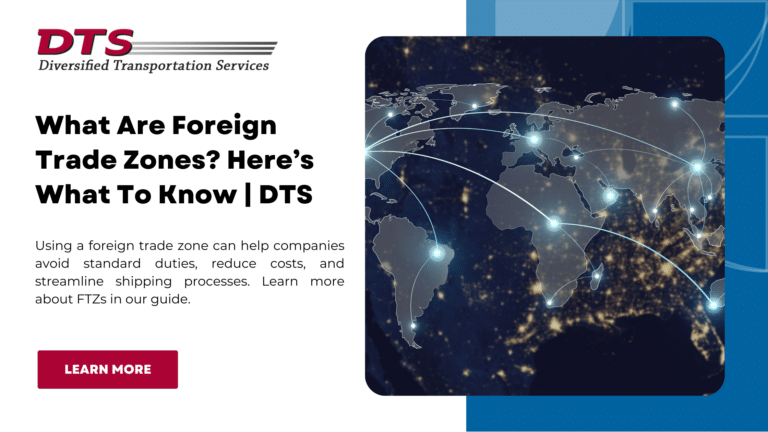
Any U.S. business that imports or exports goods or materials is navigating tricky waters right now. Rules, regulations, and tariffs are changing dramatically from one day to the next, making it hard to keep up with everything. And, on top of that, you have to find a way to make your business keeps moving despite all these changes.
If you’re looking for ways to make importing to the U.S. a little bit easier, foreign trade zones (FTZs) might be a good option.
FTZs can simplify imports and exports, and help you save money. In this post, we’ll explain what FTZs are and the benefits they offer.
A foreign trade zone is a secure, designated area within the U.S. where imported goods may be stored, assembled, manufactured, or processed without being subject to formal customs entry procedures or tariffs. However, this only lasts until the goods enter the U.S. market.
FTZs are usually based near ports of entry, such as airports, seaports, and borders. U.S. Customs and Border Protection (CBP) regulates all foreign trade zones, while the Foreign-Trade Zones Board authorizes them (under the Foreign-Trade Zones Act of 1934).
For tariff purposes, all goods located within an FTZ are considered outside of U.S. customs territory.
FTZs are a common choice for manufacturers, distributors, and third-party logistics providers.
While a foreign trade zone is similar in some ways to a bonded warehouse, the latter can only hold goods for up to five years, while companies can keep goods within an FTZ indefinitely.
Customs duties (AKA tariffs) are a major part of the daily news right now, and they have the potential to squeeze businesses’ bottom lines. Fortunately, using an FTZ is one possible solution for dealing with increased import tariffs.
One big benefit of FTZs is that they delay customs duties until goods enter the U.S. market, and they can even help businesses avoid tariffs entirely if goods are re-exported. As a result, you could send goods or raw materials to a foreign trade zone to be assembled, packaged, and tested without paying tariffs on them until they officially enter the U.S.
Here are the main benefits of foreign trade zones:
FTZs are ideal for:
If your business has high import volumes and significant tariff exposure, you could enjoy substantial benefits by using foreign trade zones. You would have the flexibility to store, assemble, and work on goods in other ways without paying the usual costs associated with bringing them into the U.S.
Crucially, FTZs benefit companies that regularly re-export goods or convert materials into finished products, as well as businesses that regularly face long waits for shipments to clear customs.
Additionally, if you tend to store goods in the U.S. for extended periods or indefinitely, using a foreign trade zone could be the right option for you.
Companies with complex or multinational supply chains may see positive results after switching to FTZs, too.
Foreign trade zones can be a valuable asset for companies in various industries, especially given the complexity of today's tariffs. Using an FTZ can lead to financial savings, improved efficiency, and smoother cash flow.
The DTS blog offers a great resource if you want to learn more about the ins and outs of freight shipping. We have articles and resources for companies in various industries, of all shapes and sizes, covering topics like retail freight shipping, trade show shipping, challenges in food and beverage logistics, and more.
And if you need help and advice navigating the changing landscape of importing goods to the U.S., our team is here to help. Get in touch to speak with us today.
Whether you're a company looking to improve one facet of your supply chain, your entire supply chain, or simply looking for a transportation and logistics consultation, we can help.